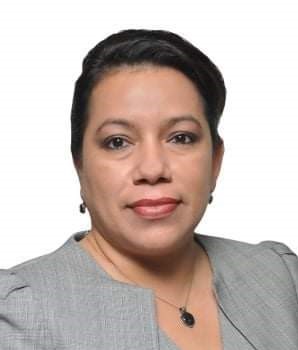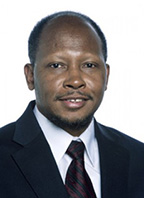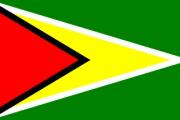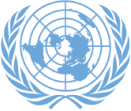Permanent Mission of the Co-operative Republic of Guyana to the United Nations
Membership of the United Nations
Guyana was admitted to membership in the United Nations by resolution A/RES/2133 (XXI) of September 20, 1966, during the twenty-first regular session of the General Assembly. This was less than four months after achieving political independence on 26 May 1966. Guyana was one of four countries that joined the UN in 1966: the others were Barbados (9 December 1966), Botswana (17 October 1966) and Lesotho (17 October 1966).
In delivering our country's inaugural address to the General Assembly (September 20, 1966), then Prime Minister Forbes Burnham, stated: "My Government subscribes to the Charter of the United Nations, it has faith in this Organization, of which it hopes to be an active rather than a sleeping Member."
Since that time Guyana has maintained an active presence and visible profile in the Organisation. During the first year of membership in the United Nations, Guyana accepted an invitation to serve on the United Nations Council for Namibia. Guyana's service in the Organisation has also extended to several of its principal organs. Guyana was elected twice as a Member of the Security Council, first in 1975-76 and subsequently in 1982-83, becoming the first Caricom country to be so elected. On both occasions, Guyana served twice as President of the Council.
Guyana also served on the Economic and Social Council (ECOSOC) from 1996 to 1998. On October 17, 2005, Guyana was elected for a second tour on ECOSOC for the period 2006 to 2008.
In 1987, Guyana’s Judge Mohamed Shahabuddeen was the first Caricom national to be elected as a Judge on the International Court of Justice, where he served with distinction during the period 1988-1997. Since 1997, Judge Shahabuddeen has been thrice elected as a Permanent Judge of the International Criminal Tribunal for the Former Yugoslavia. Judge Mohamed Shahabuddeen’s latest tour on the Tribunal will extend to 2009. In August 2005, Mr. Brynmor Pollard became the second Guyanese to be elected to the Tribunal. Mr. Pollard serves as an ad litem Judge of the International Criminal Tribunal for the Former Yugoslavia.
In 1993, H. E. Mr. Samuel R. Insanally, Permanent Representative of Guyana to the United Nations, had the distinction of being the first Caricom representative to be elected to the Presidency of the General Assembly. During the period 1993-1994, Ambassador Insanally presided over the forty-eighth session of the General Assembly.
The World Hearings on Development conducted by Ambassador Insanally was a signal feature of the 48th session. The Hearings brought together high-level personalities and development practitioners to deliberate on the key requirements for the promotion of development worldwide. The report of the President of the Assembly, contained in document A/49/320, represented one of the major inputs to the development discourse at the United Nations, and is embodied in a significant way in the Agenda for Development adopted in June 1997.
The 48th session was also the occasion for the launching of the Open-ended Working Group on the Question of Equitable Representation on and Increase in the Membership of the Security Council. By resolution 48/26 of 3 December 1993, the General Assembly decided to establish an open-ended working group to consider all aspects of the question of increase in the membership of the Security Council and other matters related to the Council. The Open-ended Working Group began its deliberations in January 1994 and has continued to grapple with this difficult question ever since.
In 1999, Guyana was elected to the Chairmanship of the Group of 77. In assuming the chairmanship of the Group of 77, Guyana became the first country with a population of less than one million to preside over the affairs of the Group.
Guyana has served on various other bodies of the United Nations, including the Council on Namibia, the Commission on Sustainable Development (1996 to 2002), the Executive Board of the United Nations Children’s Fund 1986-89 and 1999-2001.
Guyana currently sits on a variety of UN bodies, among them: the Palestinian Rights Committee, the Committee on Information; the Executive Board of the United Nations Development Programme and the United Nations Population Fund for the period 2005-2007; the Commission on Population and Development (2003-2009), and the Committee on the United Nations Population Award (2004-2006).
Nine distinguished Guyanese have to date served as Permanent Representative to the United Nations: H. E. Sir John Carter, H. E. Mr. Eustace Adolphe Braithwaite, H. E. Mr. Aloysius Paterson Thompson, H. E. Mr. Frederick Hilborn Talbot, H. E. Mr. Rashleigh Esmond Jackson, H. E. Mr. Noel Sinclair, H. E. Mr. Samuel Rudolph Insanally, H.E. Mr. George Talbot and H.E. Mr. Michael Ten-Pow.
September 2016
Permanent Representatives of the Republic of Guyana to the United Nations
|
Ambassador |
Date Accredited |
|
|
1. |
H.E. Carolyn Rodrigues-Birkett |
October 2, 2020 |
| 2. |
H.E. Mr. Michael Ten-Pow |
August 22, 2016 |
| 3. |
H.E. Mr. George Talbot |
January 2012 |
| 4. |
H.E. Dr. Samuel Rudolph Insanally |
February 18, 1987 |
| 5. |
H.E. Mr. Noel G. Sinclair |
March 7, 1979 |
| 6. |
H.E. Mr. Rashleigh Esmond Jackson |
January 30, 1973 |
| 7. |
H.E. Mr. Frederick Hilborn Talbot |
July 19, 1971 |
| 8. |
H.E. Mr. Aloysius Paterson Thompson |
August 19, 1969 |
| 9. |
H.E. Mr. Eustace Adolphe Braithwaite |
January 4, 1967 |
| 10. |
H.E. Sir John Carter |
September 21, 1966 |
H.E. Mrs. Carolyn Rodrigues-Birkett

H.E. Ambassador Carolyn Rodrigues-Birkett was accredited as Permanent Representative and Ambassador Extraordinary and Plenipotentiary of the Co-operative Republic of Guyana to the United Nations on October 2, 2020. Prior to taking up her post in New York, H.E. Ambassador Rodrigues-Birkett served as Minister of Foreign Affairs and International Cooperation (2008-2015) and Minister of Amerindian Affairs (2001-2008) of Guyana. She has also served as Director of the United Nations Food and Agriculture Organization (FAO) Liaison Office in Geneva, Switzerland from 2017 to 2020 and before that, as FAO’s Special Coordinator of Parliamentary Alliances, from 2015 to 2017.
H.E. Mr. Rudolph Michael Ten-Pow
Ambassador Rudolph Michael Ten-Pow was accredited as the Permanent Representative and Ambassador Extraordinary and Plenipotentiary of Guyana to the United Nations on 22 August 2016. Ambassador Ten-Pow presented his letters of credence to Mr. Ban Ki-moon, Secretary-General of the United Nations, in a ceremony at United Nations Headquarters in New York.
Ambassador Ten-Pow began his career in the Foreign Service of Guyana in 1980 as Desk Officer for Venezuela and later Head of the Frontiers Division. He joined the United Nations in 1986 as a Translator from French and Spanish and served for a number of years at the Economic Commission for Latin America and the Caribbean (ECLAC) in Santiago, Chile. Upon his return to Headquarters in 1991, he served successively as Reviser, Training Officer, Chief of the English Translation Service and Acting Director of the Documentation Division of the United Nations. During the period from 2013-2015, he joined the World Bank in Washington DC as Senior Programme Manager for Conference Services, returning to the United Nations in 2015 as Acting Director of the Documentation Division and later as Special Adviser to the United Nations Coordinator for Multilingualism.
The new Permanent Representative received a Bachelor of Arts Degree in French, Spanish and Portuguese from the University of Guyana with distinction. He earned Postgraduate Diplomas in Translation and Interpretation from the University of Geneva, Switzerland and a Master’s Degree in Liberal Studies with a concentration in International Relations from the City University of New York.
H.E Mr. George Talbot

Mr. George Talbot presented his credentials to Secretary-General Ban Ki-moon on 18th January 2012.
Mr. Talbot has extensive experience in multilateral diplomacy. He has represented his country at the UN and in other international fora on economic, social, political and related issues. He headed the delegation in New York during Guyana’s chairmanship of the Rio Group in 2006 and of the Union of South American Nations in 2011.
Mr. Talbot has held several posts on UN intergovernmental bodies, including Chairman of the Economic and Financial Committee of the UN General Assembly at its sixty-seventh session (September 2012 – September 2013). Other posts include vice-President of the UNICEF Executive Board; Vice-President, High-Level Committee on Technical Cooperation among Developing Countries (now High-Level Committee on South-South Cooperation); Vice-Chairman, United Nations Forum on Forests; Vice-Chairman, Commission on Sustainable Development; and vice-President of the UNDP/UNFPA Executive Board. Most recently, he served as a co-facilitator of preparations for the Third International Conference on Financing for Development, which adopted the Addis Ababa Action Agenda in July 2015.
Mr. Talbot joined the Ministry of Foreign Affairs in 1993. He holds an M.A. in International Relations from the Fletcher School of Law and Diplomacy, Tufts University; and a B.A. in Modern Languages (Spanish/French) from the University of Guyana. Mr. Talbot speaks English, Spanish, French and Portuguese.
H.E. Dr. Samuel Rudolph Insanally CCH
Mr. Samuel Rudolph Insanally presented his credentials to Secretary-General Javier Perez de Cuellar on 18th February 1987.
From 1982 to 1986, Mr. Insanally was head of the Political Division in the Ministry of Foreign Affairs of Guyana. During that time he was also high Commissioner to Barbados, Trinidad and Tobago and the Eastern Caribbean; Ambassador (non-resident), Sweden, Norway and Austria. From 1972 to 1978 he served as Ambassador to Venezuela (and non-resident to Peru and Ecuador).
From 1970 – 1972, he was Deputy Permanent Representative of Guyana to the United Nations, and during 1970 was Charge d’Affaires of the Embassy of Guyana, in Venezuela. From 1966 to 1969, he served as Counsellor at his country’s Embassy in Washington, D.C.
Prior to entering the diplomatic service, Mr. Insanally held teaching positions in modern languages from 1959 to 1966 at Kingston College, Jamaica; Queens College, Guyana; and at the University of Guyana. He received a Bachelor of Arts degree in Modern Languages from the University of London and undertook post-graduate work at the University of Paris.
H.E. Mr. Noel G. Sinclair
On 7 March 1979 Noel G. Sinclair presented his credentials to Secretary-General Kurt Waldheim.
Mr. Sinclair has served in various diplomatic positions for his Government from 1966 onwards. From 1978, he was Charge d’Affaires of the Permanent Mission of Guyana to the United Nations. Prior to that, beginning in 1977, he was Counsellor in the Guyanese Embassy, Caracas, Venezuela.
Born in Georgetown, Guyana, on 26 December 1940, Mr. Sinclair holds a B.A. degree in French from the University of the West Indies in Jamaica, which he received in 1965, and a Diploma in International Relations from a branch of the same university in Trinidad and Tobago, which he received in 1967.
After joining the Ministry of Foreign Affairs in 1966 as an Administrative Assistant, he served in 1968 as a Third Secretary in the Guyana Embassy Caracas, Venezuela. He later moved to Washington D.C., as a Second Secretary in the Embassy of Guyana (1969-1972).
Mr. Sinclair’s first tour of the duty station at the United Nations was between 1972 and 1975, when he was a First Secretary in his Government’s Mission. In 1975 and 1976, he served as First Secretary in the Guyana High Commission in Lusaka, Zambia.
In 1972, Mr. Sinclair served as personal assistant to the Secretary-General of the Preparatory Secretariat for the Conference of Foreign Ministers of Non-Aligned Countries.
Mr. Sinclair served as Permanent Representative of Guyana to the United Nations from 1979 – 1987.
H.E. Mr. Rashleigh Esmond Jackson
Rashleigh Esmond Jackson presented his credentials to Secretary- General Kurt Waldheim as Permanent Representative of Guyana on 30 January 1973.
He was born on 12 January 1929 in New Amsterdam, Berbice Guyana and received his high school education at the Central High School in Georgetown, Guyana, He then attended Queens College in Georgetown (1941 – 1948), the University College of Leicester in the United Kingdom (1954 – 1957), the University of Leicester (1960 – 1961), and Columbia University, New York (1966 - 1967).
He obtained the degrees of B.A. (General) and B.S. (Honours), London, and a Graduate Certificate in Education, Leicester. He attended Columbia University on a Carnegie Fellowship in Diplomacy.
He Joined the Guyana Public Service in 1948. In 1957, he was appointed Master, Queens College, Georgetown and in 1965 he became Principal Assistant Secretary in the Ministry of External Affairs in Guyana. From 1969, he served as the Permanent Secretary of the Minister of External Affairs.
He was a member of the delegation of Guyana top the twenty-sixth and twenty-seventh sessions of the General Assembly.
Mr. Jackson subsequently served as the Minister of Foreign Affairs from 1978 to 1990.
H.E. Rev. Frederick Hilborn Talbot
Frederick Hilborn Talbot, presented his credentials as Permanent Representative of Guyana to the United Nations to the Secretary-General U Thant on July 19, 1971. He was accompanied by Yuri Zibanov, Assistant Chief of Protocol.
Mr. Talbot was active in a number of religious and social welfare positions before taking up his appointment to the United Nations.
He was born on 13 October 1927 in Georgetown, Guyana. He holds the Bachelor of Arts degree from Allen University, South Carolina (1954) and the Bachelor of Divinity degree from Yale University (1957). He has also pursued special studies in African Affairs, graduate studies in divinity at the University of California in Berkeley, California, and graduate studies in Education at Columbia University, New York.
He served as Pastor in-charge of St. Peters A.M.E. Church in Georgetown, Guyana, and as Caribbean Consultant of the Church World Service.
He was Chairman of the Guyana Council of Churches and a member of the Board of Poor Law Commissioners of Guyana, of the Government Hospitals Committee, of the Board of the Y.M.C.A. and of the World Methodist Council.
H.E. Mr. Aloysius Paterson Thompson
Aloysius Paterson Thompson presented his credentials presented his credentials as Permanent Representative of Guyana to the United Nations to the Secretary-General U Thant on August 19, 1969. He was accompanied by Mohamed Tabiti, United Nations acting Chief of Protocol.
Mr. Thompson was a businessman and radio and newspaper commentator on Guyanese and Caribbean public affairs.
Born on 22 October 1931 in Georgetown, Guyana, he was educated at St. Stanislaus College in Georgetown and later graduated in business management from Bristol University in the United Kingdom.
He has served as an executive or member of the board of directors of many companies in Guyana, including Guyana Stockfeeds Ltd., Bookers Rum Company Ltd., Guyana Industrial Holdings Ltd., Albion Distilleries Ltd. and Guyana Distilleries Ltd. Throughout his business career, Mr. Thompson has been a member of the Guyana Manufacturers’ Association and a member of its Executive Committee. He was a member of the Association’s delegation to the Government of Guyana on the establishment of the Caribbean Free Trade Association.
In 1962, he was a member of the Guyana delegation to the Duke of Edinburgh’s study conference on problems of industrial development in developing countries of the British Commonwealth, held in Canada.
H.E. Mr. Eustace Adolphe Braithwaite
Eustace Adolphe Braithwaite presented his credentials as Permanent Representative of Guyana to the United Nations to the Secretary-General, U Thant on January 4, 1967. He was accompanied by Pierre de Meulemeester, United Nations Chief of Protocol.
Mr. Braithwaite was born on 27 June 1912. He holds a B.Sc. degree in Physics from New York University and a M.Sc. from Cambridge University, England. He served in the Royal Air Force during the second world war. He taught school in London from 1950 to 1957 and, from 1958 to 1960 held the post of Welfare Officer at the London County Council.
In 1960, Mr. Braithwaite was appointed Human Rights Officer of the World Veterans Federation in Paris, France. From 1963 to 1966, he was Lecturer and Education Consultant at the United Nations Educational, Scientific and Cultural Organization in Paris, and in this capacity conducted lecture tours of Australia and New Zealand.
Mr. Braithwaite is the author of a number of books: “To Sir, With Love” (1959); “A Kind of Homecoming” (1961); “Paid Servant” (1962); and “A Choice of Straws” (1965). He received the Anisfield Wolff Literary Award in New York for “To Sir, With Love.”
H.E. Sir John Carter
Sir John Carter presented his credentials as Permanent Representative of Guyana to the United Nations to the Secretary-General, U Thant on September 21, 1966. He was accompanied by Pierre de Meulemeester, the United Nations Chief of Protocol.
Sir John was born on 27 January 1919 in Demerara, British Guiana, now Guyana. He was educated at Queen’s College, Georgetown, and at London University where he received his B.A. and LL.B degrees. He was a member of Middle temple, London, and was called to the Bar in 1942.
Sir John practised law in Guiana from 1945 until 1966 and in 1962 was made a Queen’s Counsel. He was knighted by Queen Elizabeth in June 1962.
Active in the political and civil life of his country, Sir John was a member of the Guiana Legislature from 1940 to 1953, and from 1961 to 1964. He was Pro-Chancellor of the University of Guiana, 1962-1966.
After his country gained independence, Sir John was appointed Ambassador to the United States in June 1966. He occupied the dual positions of Permanent Representative to the United Nations and Guyana’s Ambassador in Washington, DC.
Government of Guyana Initiatives at the United Nations
New Global Human Order
The proposal of a New Global Human Order is an initiative of the Government of Guyana aimed at mobilising concerted global action over the long-term, within a holistic framework, to address development challenges and improve the wellbeing of people. A central theme of Guyana's proposal is a concern with reversing the growing disparities between rich and poor and a focus on human development. It seeks to promote a strong political consensus and a broad-based global partnership to combat poverty and promote economic security, based on a long-term integrated approach to development. This proposal was first introduced to the United Nations General Assembly at its fifty-fifth session in the year 2000 under the agenda item, “the role of the United Nations in promoting a New Global Human Order.”
The United Nations General Assembly has considered the proposal at its 55th, 57th and 59th, 61st and 62nd sessions and has to date adopted resolutions 55/48, 57/12 and 62/213 respectively. In resolution 55/48, the Assembly took note of the proposal and requested the Secretary-General to seek the views of member states and of the agencies and organisations of the United Nations system. In response to this mandate, the Secretary-General submitted a report to the 57th session contained in document A/57/215. In addition to the views of Guyana and the Philippines, there were responses from several UN agencies.
The Secretary-General’s report concluded, among other things that, there was a need for further clarification of the boundaries and content of the proposal of a new global human order. Hence, resolution 57/12, inter alia, called for the further elaboration of the proposal, and invited proposals for consideration at the 59th Session of the General Assembly (2004). During the fifty-ninth session, the Government of Guyana submitted an updated memorandum on the New Global Human Order contained in document A/59/283. Under the terms of resolution 62/213 , the General Assembly inter alia, requests the Secretary-General to submit a report to the sixty-fifth session of the General Assembly on the implementation of the said resolution and "to include in that report an assessment of the implications of inequality for development"
In addition to its consideration by the General Assembly, the proposal of a New Global Human Order has been introduced in several intergovernmental fora, including the Non-Aligned Movement Conferences, where it has found reflection in several outcome documents of the Movement, including in the final document adopted by the Thirteenth Conference of Heads of State or Government of NAM (February 2003) and the Fourteenth Meeting of Ministers of Foreign Affairs of NAM (August 2004); the South Summit of the Group of 77 (April 2000); and most recently at the Annual Meeting of Foreign Ministers of the Organisation of the Islamic Conference (September 2003 and 2004). In addition to Guyana, the proposal of a New Global Human Order enjoys the support of the Member States of the Caribbean Community among other countries.
Guyana Permanent Mission to the UN
New York – August 2008


